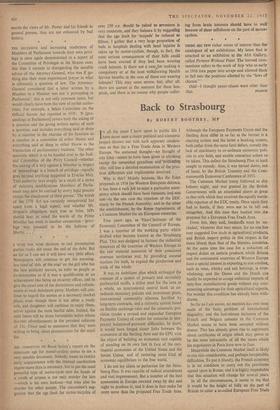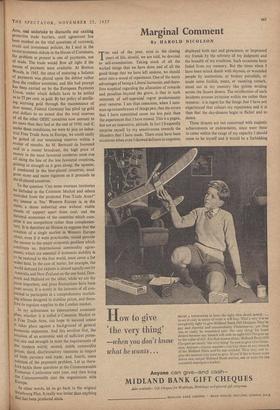Back to Strasbourg
By ROBERT BOOTHBY, MP
N all the years I have spent in public life I I have never seen a major political and economic project thrown out with such apparent careless- ness as that for a Free Trade Area in Western Europe. No sustained thought—no thought of any kind—seems to have been given to anything except the somewhat grandiose and "miSleatinrg title; still less a detailed examination of the prac- tical difficulties and implications' involved.
Why is this? Mainly because, like the Eden proposals in 1954 for Western European defence, it has been a rush job to meet a particular emer- gency which should have been foreseen, and was not—in the one case the rejection of the EDC treaty by the French Assembly; and in the other the establishment, by the Rome Agreements, of a Common Market for six European countries.
Five years ago, as Vice-Chairman of the Economic Committee of the Council of Europe, I was a member of the working party which drafted what became known as the Strasbourg Plan. This was designed to harness the industrial resources of the countries of Western Europe. to the raw material resources of their associated overseas territories and, by providing assured markets for both, to expand the production and trade of the whole.
It was an ambitious plan which envisaged the creation of a system of primary and secondary preferential tariffs, a dollar pool for the area as a whole, an international central bank to co- ordinate monetary policies and investment plans, international commodity schemes fortified by long-term contracts, and a currency system based on flexible exchange rates and the automatic pro- vision (under a revised and expanded European Payments Union) of credits for countries in tem- porary balance-of-payment difficulties. In short, it would have forged closer links between the economies of the Sterling Area and the EPU with the object of building an economic unit capable of standing on its own feet in face of the con- tinental economies of the United States and the Soviet Union, and of restoring some kind of economic equilibrium to the free world.
I do not lay claim to perfection for the Stras- bourg Plan. It was capable of radical amendment and vast improvement. But a number of the best economists in Europe sweated away by day and night to produce it; and it does in fact make far more sense than the projected Free Trade Area. Although the European Payments Union and the Sterling Area differ in so far as the former is a clearing system and the latter a banking system, both suffer from the same fatal defect, namely the lack of machinery to co-ordinate economic poli- cies in any field, and enable concerted action to be taken. This defect the Strasbourg Plan at least sought to remedy. Alas, it was turned down, out of hand, by the British Treasury and the Com- monwealth Economic-Conference of 1953.
The Common Market treaty followed as day follows night; and was greeted by the British Government with an astonished alarm as great as that with which they received the equally inevit- able rejection of the EDC treaty. Once again they had to hustle, if they were not to be left out altogether. And this time they hustled into the proposal for a European Free Trade Area.
From this, they said, foodstuffs must be 'ex- cluded,' whatever that may mean; for no one has ever suggested free trade in agricultural products, and British import policy in this respect is far more liberal than that of the Messina countries. At the same time the case for a reduction of import duties on certain products which Britain and the continental countries of Western Europe have a special interest in exporting to one another, such as wine, whisky and salt herrings, is over- whelming; and the Danes and the Dutch can hardly be expected to accept unlimited imports of duty-free manufactured goods without any com- pensating advantage for their agricultural exports. No wonder this condition has already been with- drawn.
So far as I am aware, no mention has ever been made of the basic problem of international illiquidity; and the last-minute inclusion of the French and Belgian colonies in the Common Market seems to have been accepted without demur. This has already given rise to arguments about certificates of origin which may prove to be the most intractable of all the issues which the negotiators in Paris have now to face.
Meanwhile the Common Market itself is likely to run into considerable, and perhaps insuperable, difficulties. To put it bluntly, the French cconomy, is in no condition to carry out the provisions agreed upon in Rome; and it is highly improbable that this situation will change for several years.
In all the circumstances, it seems to me that it would be the height of folly on the part of Britain to enter a so-called European Free Trade Area, and undertake to dismantle our existing protective trade barriers, until agreement has been reached on the vital questions of currency, credit and investment policies. As I said in the recent economic debate in the House of Commons, the problem at present is one of payments, not of trade. The trade would flow all right if the means of payment were available. At Bretton Woods, in 1945, the onus of restoring a balance of payments was placed upon the debtor rather than the creditor countries; and this bad precept has been carried on by the European Payments Union, under which deficits have to be settled as to 75 per cent, in gold. By her policy of sterilis- ing accruing gold through the maintenance of dear money, Federal Germany has piled up gold and dollars to an extent that the total reserves of all the other OEEC countries now amount to no more than they had at the end of 1950; and if, under these conditions, we were to join an indus- trial Free Trade Area in Europe, we could easily be gutted of our remaining reserves within a matter of months. As M. Bertrand de Jouvenel said in a recent broadcast, the high price of money in the most favoured countries must run all along the line of the less favoured countries, gaining in strength as it goes along; the squeeze, if conducted in the best-placed countries, must grow more and more vigorous as it proceeds to the ill-placed countries.
To the question 'Can some overseas territories be included in the Common Market and others excluded from the projected Free Trade Area?' my answer is 'No.' Western Europe is, in the main, a dense industrial area without visible means of support apart from coal; and the national economies of the countries which com- prise it are competitive rather than complemen- tary. It is therefore an illusion to suppose that the creation of a single market in Western Europe alone, even if it were practicable, would provide the answer to the major economic problem which confronts us. International commodity agree- ments, ments, which are essential if economic stability is to be restored to the free world, must cover a far wider field. In the case of butter, for example, the world dethand for exports is almost equally met by Australia and New Zealand on the one hand, Den- mark and Holland on the other, while we are the main importers; and price fluctuations have been most severe. It is surely in the interests of all con- cerned to participate in a comprehensive market- ing scheme designed to stabilise prices, and there- fore to regulate supplies to the London market.
in my submission no international economic Plan, whether it is called a Common Market or 11, Free Trade Area, can hope to succeed unless it takes place against a background of general economic expansion. And this involves first, the creation of an economic unit of sufficient poten- tial size and strength to meet the requirements of the modern world; second, stable commodity Prices; third, discriminatory measures in respect of both currency and trade; and, fourth, some solution of the payments problem. Let us there- fore tackle these questions at the Commonwealth Economic Conference next year, and then bring the Commonwealth into the negotiations with Europe.
In other words, let us go back to the original Strasbourg Plan. It really was better than anything that has been produced since.











































































 Previous page
Previous page